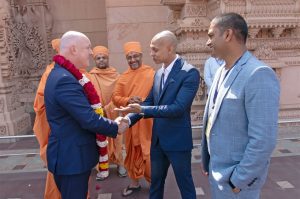Christopher Luxon Diaspora Outreach: As New Zealand approaches another decisive election, Prime Minister Christopher Luxon has intensified his engagement with multicultural communities, with special emphasis on the country’s Indian diaspora. Recently, Luxon and his wife Amanda were honored at a cultural gathering hosted by the Christchurch Bengali community, where they were welcomed with gifts symbolizing Kolkata’s heritage, including an umbrella featuring the Victoria Memorial and Howrah Bridge, along with a copy of Rabindranath Tagore’s Gitanjali.
While these gestures may appear symbolic, they carry profound significance. They highlight Luxon’s attempt to connect with one of New Zealand’s fastest-growing and economically influential communities while also reflecting the intersection of domestic politics and international diplomacy.

The Indian Diaspora in New Zealand
The Indian community is the third-largest ethnic group in New Zealand, after Europeans and Māori. According to recent census data, Indian New Zealanders make up nearly 5–6% of the total population. Their contributions are visible across industries such as technology, business, education, and healthcare. Many are first- or second-generation migrants who maintain strong cultural ties with India while embracing Kiwi identity.


The diaspora is also a significant economic engine, estimated to contribute billions annually to the national economy. Small business ownership among Indian New Zealanders is particularly high, with many operating in retail, hospitality, and logistics. Their role in higher education—both as international students and academics—adds another layer of influence.
Christopher Luxon Diaspora Outreach: Why This Engagement Matters Now
Luxon’s engagement is not coincidental. With the general election approaching, diaspora votes matter more than ever. The Indian community, concentrated in Auckland, Wellington, and Christchurch, represents a bloc that can influence parliamentary seats.
Moreover, political parties in New Zealand are increasingly aware of the soft power of cultural outreach. Attending community events, celebrating festivals like Diwali and Holi, and addressing diaspora concerns about immigration and business opportunities have become campaign essentials. Luxon’s move to participate in Bengali community activities underscores this recognition.


Symbolism of the Bengali Connection
Choosing a Bengali cultural gathering is especially meaningful. Bengal represents a cradle of Indian intellectualism, literature, and politics. By accepting Gitanjali—Tagore’s Nobel-winning poetry collection—Luxon symbolically aligned himself with values of humanism, spirituality, and multiculturalism.
For the Bengali diaspora, such gestures are not just ceremonial; they represent recognition of cultural identity within a broader national framework. This, in turn, builds emotional bonds that can translate into trust and political support.
Domestic Politics: Coalition Challenges
Luxon currently leads a coalition government, which requires balancing diverse political priorities. While his administration has been scrutinized for its policies on Māori rights and public services, his outreach to Indian communities can be seen as a counterbalancing act—demonstrating inclusivity in other areas.
Critics argue that such gestures are “performative multiculturalism,” while supporters highlight that engagement is a crucial step toward integrating ethnic minorities into New Zealand’s political narrative.
Economic and Trade Dimensions
Luxon’s community outreach also reflects his government’s growing emphasis on India as a strategic economic partner. Earlier this year, he visited India with a high-level delegation to reignite negotiations on a Free Trade Agreement (FTA). Sectors such as agriculture, dairy, education, and technology were discussed as key points of collaboration.
For the Indian diaspora in New Zealand, such policies are not abstract—they directly affect family businesses, student migration, and remittance flows. Thus, his presence at cultural gatherings doubles as a reassurance that their concerns are being woven into larger economic policies.
Cultural Diplomacy as Political Capital
Community outreach in New Zealand is often about more than votes—it is also about narrative building. By appearing at Indian cultural events, Luxon reinforces an image of a leader attuned to the country’s multicultural identity.
This is particularly important in a society where immigration debates occasionally spark tension. Publicly embracing Indian culture sends a message that diversity is not just tolerated but celebrated.
Historical Context: India–New Zealand Relations
India and New Zealand share a relationship that stretches back to the colonial era through Commonwealth ties and migration. However, relations have deepened significantly in recent decades:
- Education: Thousands of Indian students pursue higher education in New Zealand annually.
- Trade: Bilateral trade exceeds NZD 2 billion, with growth potential in IT, dairy, and renewable energy.
- Culture: Indian festivals have become part of New Zealand’s cultural calendar, often attended by politicians across the spectrum.
- Defense & Strategy: Recent agreements have brought cooperation in maritime security and Indo-Pacific strategy to the forefront.
Luxon’s outreach to diaspora communities dovetails with this broader foreign policy orientation.
Challenges and Criticism
While Luxon’s gestures resonate with many, critics question whether such outreach translates into concrete policy change. Issues such as visa backlogs, student work rights, and small business support remain unresolved for many diaspora members.
Moreover, his government’s policies on indigenous Māori institutions have been criticized as regressive by activists. This raises the question of whether selective multiculturalism is being practiced—embracing some communities while sidelining others.
Election Implications
The upcoming election will test whether diaspora outreach can meaningfully shift voter behavior. Indian New Zealanders have historically leaned toward Labour, but dissatisfaction with economic conditions and immigration delays could make them more receptive to Luxon’s National-led coalition.
The Indian vote in Auckland, where many constituencies are tightly contested, could prove decisive. Thus, community engagement may not only be cultural diplomacy but a critical election strategy.
Conclusion
Christopher Luxon’s engagement with the Indian community illustrates how diaspora outreach has become central to modern politics. What might seem like a simple exchange of gifts at a Bengali cultural event is, in reality, a layered gesture—blending election strategy, cultural recognition, and foreign policy signaling.
Whether this will translate into electoral success depends on how effectively his government addresses the diaspora’s practical concerns alongside symbolic gestures. But one thing is clear: the Indian community’s role in shaping New Zealand’s political and cultural future is stronger than ever, and leaders like Luxon are keenly aware of it.
📌 External Sources for Further Reading
- India–New Zealand Relations Overview (Wikipedia)
- RNZ on Māori–Indian collaborations in New Zealand
- Eurasia Review: India–New Zealand strengthen ties after Luxon’s visit

